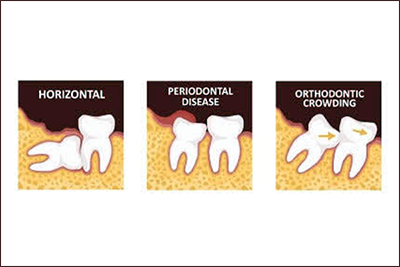Frequently Asked Questions Related with Wisdom Teeth / Third Molar

What are wisdom teeth?
Wisdom teeth don’t make you smarter. They get their name because they usually emerge in the mouth at the cusp of adulthood between the age of 17 and 25 years.
Why do we not need the wisdom teeth now?
Wisdom teeth served the purpose long time ago, when we foraged foods like twigs and tough raw meat. The wisdom teeth are not needed now since we no longer need that extra grinding power. There is less space for wisdom teeth to emerge as our jaw bones have also decreased in size.
How do I know whether I need the removal of wisdom teeth?
Pain is usually the first and probably the most common sign for the removal of wisdom teeth. This dull aching pain can be so consistent that it causes headache and makes eating difficult.
What can be the reasons for the removal of the wisdom teeth?
Some of the reasons are as below:
- Pain
- Repeated infection of the soft tissue around that area.
- Extensive decay of the wisdom tooth.
- Sometimes there is not enough room for the wisdom tooth to emerge in the right position. When this occurs, they get impacted and need to be removed.
- Formation of a cyst (fluid filled sac).
What happens if you don’t get problematic wisdom tooth removed?
Some of the problems are:
- Trouble while opening or closing of the mouth.
- Swelling of the lymph nodes around the throat.
- In a typical pericoronitis infection, food or plaque gets in under gums thereby damaging the semi-erupted third molar. If left untreated, it can cause serious health problems.
- They mis-align the other teeth.
At the time of eruption of third molar, how long does the pain last?
When the third molar are emerging, we may find periods of aching on and often until they have erupted fully. This could last for a year or two. A consistent severe pain may be a sign of having an impacted tooth which needs to be removed.
When is the removal of the third molars advised for the orthodontic patients?
In most of the cases the removal can be postponed until the end of the orthodontic treatment. In some situations, they may have to be removed even at the beginning of the treatment.
How long does it take to recover, after the removal of wisdom tooth?
With proper care, recovery happens within two weeks though recovery time differs from patient to patient. However daily activity can be started after 2 – 3 days. If the blood clot gets dislodged from the wound, the wound will get infected, and the recovery time will be longer.
How can we speed the recovery after the surgery?
It is important that blood clot should not get dislodged, so some of the things to be avoided are.
- Avoid aggressive rinsing of the mouth.
- Avoid taking hot drinks.
- Avoid foods that requires chewing.
- Avoid smoking or drinking alcohol.
You can schedule a consultation appointment with Dr. Seema Bansal for more informantion.

Much needed information about the wisdom teeth!
Thankyou Priyanka for your comment .
Rightly explained !
Superb information
Thankyou Dr Mamta for your comment .
Very Informative information, keep sending.
Thankyou Ashish for your comment .
Very insightful.
Thankyou Garima for finding it useful .
Thank you for the much needed information.
Thankyou Aastha for finding it informative .
Very informative ?
Thankyou Sneha for your comment .